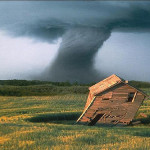We run our website the way we wished the whole internet worked: we provide high quality original content with no ads. We are funded solely by your direct support. Please consider supporting this project.

Spiritual Warfare: What is it?
The Kingdom is “not of this world,” and neither is its warfare. Jews had always believed that God confronted spiritual opposition in carrying out his will on earth. In the Old Testament, these evil forces were usually depicted as cosmic monsters and hostile waters that threatened the earth. For a variety of reasons this belief in spiritual warfare intensified significantly in the two centuries leading up to Christ.
This intensified understanding of evil and this new view of history is commonly referred to as the “apocalyptic” worldview. The authority ascribed to Satan in the New Testament, the frequent depictions of illness and deformities as demonically caused, and the general characterization of this present epoch as evil and as approaching its end all reflect this worldview.
We find references to Satan, rulers, principalities, powers and authorities, along with dominions, cosmic powers, thrones, spiritual forces, elemental spirits of the universe, gods, and a number of other spiritual entities. For short, I’ll just call them “Powers.”
Understanding this worldview helps us see that Jesus’ radically countercultural ministry wasn’t first and foremost a form of social and political protest, though it certainly was that. It was, rather, most fundamentally a form of spiritual warfare.
This apocalyptic context makes it clear that Jesus’ deliverance ministry wasn’t the only way Jesus confronted evil. Every aspect of the Kingdom of God Jesus manifested revolted against a corresponding aspect of the kingdom of the Powers. In Jesus, and in the movement he came to establish, the long expected apocalyptic battle between God and the Powers was—and still is—being waged.
When Jesus revolted against the oppressive religion of his day, for example, he was engaging in warfare against the Powers that use religion to oppress people. So too, when Jesus refused to live in accordance with his culture’s assumptions, laws, and social taboos regarding nationalism, race gender, class, and wealth, he wasn’t just waging a social protest; he was engaging in warfare against the Powers that oppress people.
Paul reflects this point when he informs us that “our struggle is not against flesh and blood, but against rulers, against the authorities, against the powers of this dark world and against the spiritual forces of evil in the heavenly realms.” From a Kingdom perspective, if it’s got “flesh and blood”—if it’s human—it’s not our enemy. To the contrary, if it’s got “flesh and blood” it’s someone we’re commanded to love and thus someone we’re to be fighting for—even if they regard us as their enemy.
The primary way we wage war on behalf of others, including our enemies, is by imitating Jesus and refusing to buy into any aspect of the Powers’ oppressive regime—including the universal tendency to make other people our enemies. Whereas earthly wars are fought with pride, strength, and violence, the Kingdom war is fought in humility, weakness and love. Any aspect of our own life, our society, or our global community that is under the Power’s influence and is inconsistent with the loving reign of God as revealed in Jesus is something that we are called to revolt against.
—Adapted from Myth of a Christian Religion, pages 30-32
Image by h.koppdelaney via Flickr
Category: Q&A
Tags: Humility, Jesus, Kingdom Living, Love, Myth of a Christian Religion, Satan, Spiritual Warfare
Topics: Spiritual Warfare, Cosmic Conflict
Related Reading

“Natural” Evil? 7 Arguments Implicating Satan
Image by Jmos® via Flickr We believe that God is the Creator of nature, but nature simply does not seem to point to a God of love. Parasites, viruses, bacteria, diseases and cancer kill millions and torment millions more, humans and animals alike. Earthquakes, hurricanes, tsunamis, mudslides and volcanoes do the same. Theists have traditionally argued that…

Do the Gospels Promote Anti-Semitism?
Over the last couple of weeks we have been looking at various passages from the Gospels that have been used by some to argue that Jesus condones violence. Here is a link to each of them: The Cleansing of the Temple and Non-Violence Was Jesus Unloving Toward the Pharisees? Violent Parables? Why Did Jesus Curse…

Paradigm Shift Questions
A couple that was recently introduced to ReKnew and several of my books recently wrote to tell me that they are in the process of embracing the warfare worldview along with the open view of the future. They said that they “realize that these things aren’t minor adjustments but are rather all-encompassing paradigm shifts in…

Theology That Accounts for Terrorism
The general assumption of both the Old and the New Testaments is that the earth is virtually engulfed by cosmic forces of destruction, and that evil and suffering are ultimately due to this diabolical siege. Jesus defined himself and his ministry in terms of aggressively warring against Satanic forces. Both he and his disciples recognized…

Sermon: The Salt and Light Revolution
What does it mean to be the salt and light? In Greg’s sermon last weekend, he explores how followers of Jesus can step out of the crowd in ways that bring these good things to the world around us. Visit the Woodland Hills website for this week’s sermon resources.

What is the Kingdom of God (Part 1)
We all know what the Kingdom of God is, right? But this is precisely the problem. Since we are all to a large extent products of our culture, what seems obviously true and right to us will be at least influenced, if not determined, by what seems obviously true and right to our culture. This,…
